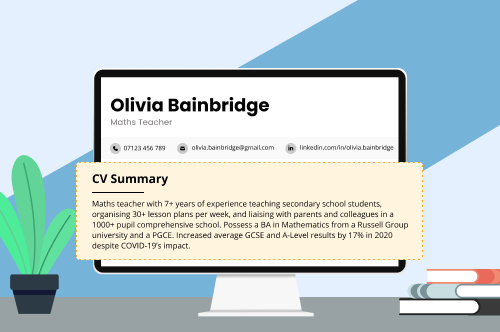If you’re still not entirely clear on what transferable skills are, check out this video before you dive into our skills list:
What are transferable skills?
Transferable skills are abilities that can be used across different jobs, even in settings extremely different from where you originally learned or developed the skill.
Most transferable skills are soft skills (personality traits that affect how you work), but some transferable skills are hard skills (those learned through training). For example, good time management is a soft transferable skill and computer literacy is a hard transferable skill.
While important in both the workplace and personal life, transferable skills are especially important if you’re looking to:
- change careers
- find your first job
- return to work after an extended break
Showing that you have transferable skills, such as effective organisational skills, assures employers you’ll do your work well if they hire you.
Additionally, transferable skills like critical thinking and problem solving, allow you to learn new skills quickly, which is especially important to employers if you don’t have traditional training or experience in the role.
10 transferable skills examples
Here are some examples of transferable skills that all employers are looking for:
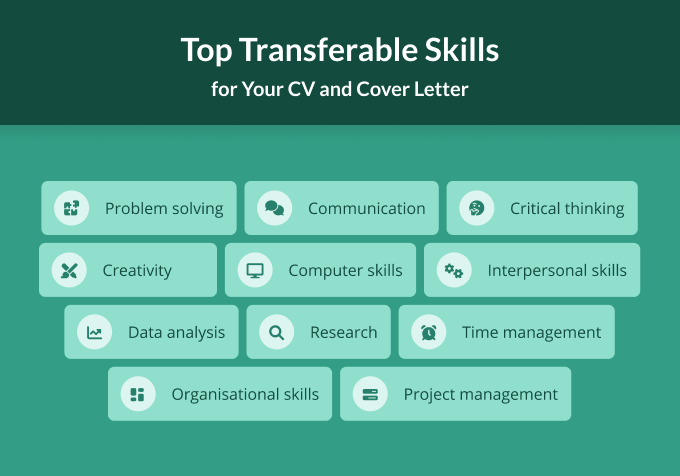
1. Problem solving
At every job, you’ll meet with problems sooner or later. Employers are looking for workers who can solve problems unsupervised by collecting information, testing assumptions, weighing different options, and applying solutions.
2. Critical thinking
Critical thinking skills include many of the same skills involved in problem solving but are not always directed at a problem. Beyond problem solving, you can use critical thinking to make improvements and find new opportunities for your organisation, such as streamlining an already excellent inventory management system or finding a new market for your company’s product.
3. Interpersonal skills
In any job, you’ll need good interpersonal skills to interact with coworkers and customers. For example, conflict resolution is an essential interpersonal skill to have whether you’re a manager handling a dispute between colleagues or a server dealing with an unreasonable diner.
4. Organisation
Organisational skills involve keeping track of your work in a logical, easy-to-find manner, such as in a physical filing system, your online scheduler, or your mental to-do list. Great organisational skills keep you from losing track of appointments and tasks.
5. Time management
Good time management skills allow you to complete tasks efficiently, which signals to employers that you can meet deadlines. The best way to demonstrate time management abilities on your CV is by adding numbers and time frames for your achievements.
See an example of what to put in a CV to highlight the transferability of your time management skills with hard numbers:
6. Project management
Effective project management combines organisational, time management, and interpersonal skills to complete a more long-term task. Project management requires setting goals, breaking down the goals into manageable tasks, solving problems that come up, and following through to finish by the deadline.
7. Communication
Communication skills include written and verbal communication, and involve exchanging information or ideas with others in a way that’s easy to understand, logical, and engaging. Great communication strikes a balance between being concise and giving others enough detailed information. Whether you’re a lawyer writing a brief or a salesman showing off your newest product, effective communication skills are essential for working with colleagues and customers.
8. Creativity
You may think of it as a skill mainly required in artistic fields, but all jobs need creativity. Employers are always looking for employees who can think of new products, find inventive solutions, and set positive trends inside and outside the company.
9. Computer skills
Whatever your role is, you’ll need to master a computer’s basic functions, including sending emails, searching the internet, and using Microsoft Office. Also, more complex computer skills, such as programming and design software expertise, are becoming more commonplace as fields from education to finance rely on big data and having an online presence.
10. Data analysis
Whether you’re a doctor evaluating a patient’s lab results or a financial analyst working for a large corporation, you’ll have to know how to organise and analyse data to draw conclusions. While you should describe your mental data analysis process when you make a CV, ensure you also mention any specific software or programming languages you use to evaluate data.
And to summarize the above tips, here’s a TikTok showcasing the top 10 transferable skills you’ll need to succeed:
@resumegenius Here’s a list of top 10 transferable skills you can add to your resume in 2022 #resume #resumetips #jobsearch #jobsearchtips #careeradvice ♬ Aesthetic – Tollan Kim
How to identify the transferable skills your future employer wants
If you’re thinking of applying for roles you’ve not held before, you may know you need to emphasise your transferable skills. But if you’re still unclear which are the most important for your new role, follow the three steps below to identify the transferable skills your target employers are looking for:
1. List all your achievements
Transferable skills can come from anywhere, not just work experience. So to find your transferable skills, first list achievements to put on your CV, including those from:
- extracurricular activities
- volunteer work
- school
- personal goals
2. Identify the transferable skills needed for each achievement
Off the top of your head or using our list of transferable skills, note the skills you used to complete each achievement. There’ll likely be several transferable skills per achievement.
Here’s an example of an applicant’s achievements and their related transferable skills:
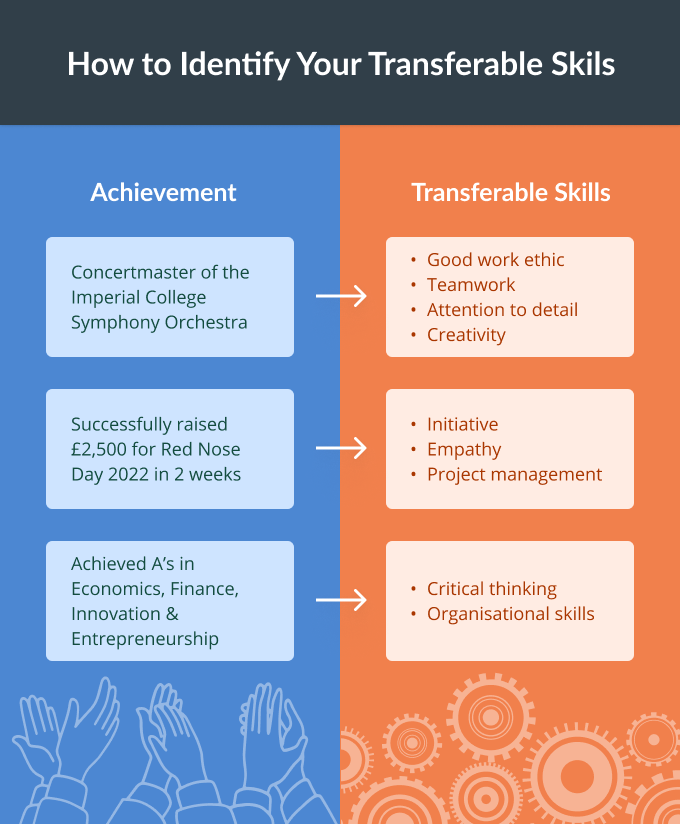
3. Match your transferable skills to the job description
Many descriptions will list skill requirements that directly match those listed in the skills column of your brainstorming sheet. For example, communication skills are commonly written into job descriptions. But you may have to read in between the lines to find other transferable skills that the role is calling for.
Below, we underline key words from a job description and note the transferable skills they’re signaling:
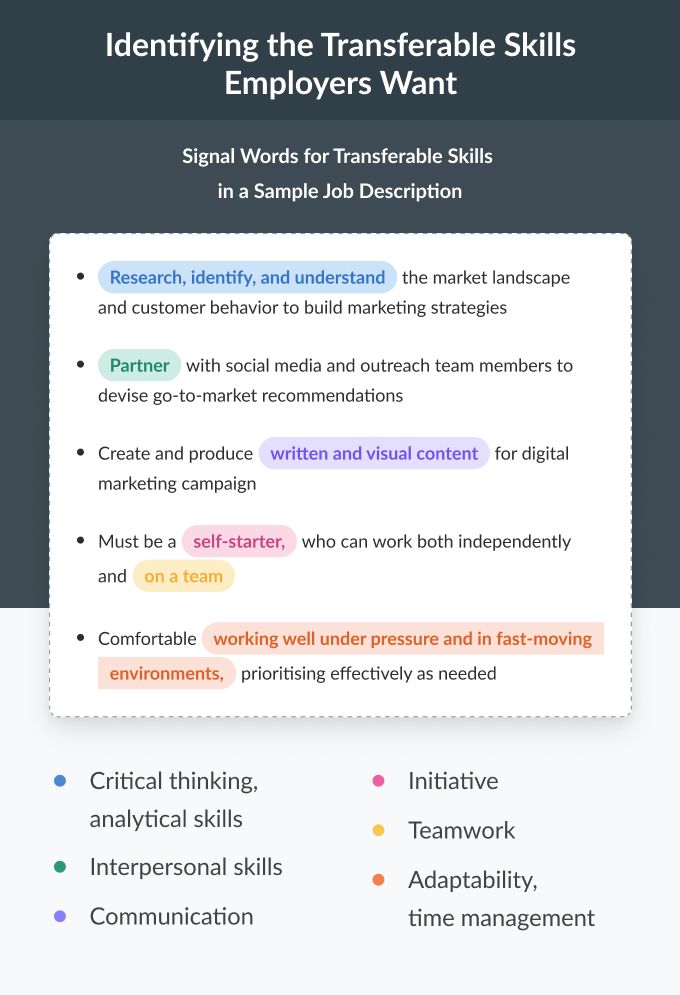
How to put transferable skills on your CV
Not confident about how to write a great CV with transferable skills on it? This section provides examples of how to add them to your CV.
1. Highlight transferable skills in your personal statement
Your personal statement (also known as a CV profile) is the first section of your CV a hiring manager will read, so make sure to include transferable skills from the job description when you write this section.
Here’s an example of how an applicant demonstrates transferable skills in their personal statement:

2. Include transferable skills in your skills section
Because your CV’s skills section shouldn’t take up too much space compared to other sections — unless you’re writing a skills based CV that leads with a large skills section — only list transferable skills that directly address the job posting.
Here’s an example of transferable skills listed in the skills section of a CV for a software engineer:

3. Give examples of transferable skills in your work experience section
Your work experience section is the best place to provide concrete evidence of your transferable skills. Describe achievements using numbers, where possible, that speak to your transferable skills.
Below are two examples of transferable skills statements from applicants who are changing career paths. We’ve bolded the transferable skills these applicants can use to successfully transition to new roles:
Teacher applying to non-teacher positions
- Managed a classroom of 30+ students, including creating curricula, multitasking between grading assignments and supervising group work, and delivering lectures
Retail worker applying to non-retail positions
- Coordinated schedules for 10+ retail associates, applied maths skills to balancing the cash register drawer, and effectively assisted customers by remembering their requirements and anticipating their needs
4. Showcase transferable skills in your hobbies and interests section
Employers can get an idea of what transferable skills you have from the activities you list in your hobbies and interests section. List active, rather than passive, hobbies to show employers your personality while revealing your transferable skills. Be as specific as possible without letting a single hobby exceed one line.
Notice the difference in impact between a general description of a passive hobby and a specific description of an active hobby:
General example of a passive hobby
Enjoy watching TV
Specific example of an active hobby
Updating my YouTube channel with film reviews
The good example of a hobby above shows employers that you have transferable skills in:
- creativity
- analytical thinking
- verbal communication
- initiative
Even better, this hobby shows employers that you have technical skills like video editing and social media management that — while not transferable to all jobs — are still usable in many different fields.
If you want to highlight your video editing skills, consider making a video CV that shows employers exactly what kind of work you can produce for them.
How to discuss transferable skills in your cover letter
While an important part of any job seeker’s application, a cover letter is an especially great place for first-time job seekers and career changers to pitch their qualifications to employers. And a key part of these applicants’ qualifications are their transferable skills.
As a complement to your CV, learn how to write a cover letter (or make one using an AI-powered cover letter builder) that:
- mentions transferable skills you didn’t include on your CV
- provides more detail about transferable skills your CV already highlights
Below we go through how to put transferable skills in your cover letter to keep employers interested in your application, even if you don’t have experience relevant to the role.
1. Mention transferable skills in your cover letter introduction
Your cover letter’s introduction leaves a big impression on hiring managers because it’s the first part of your letter they read. In addition to telling them what role you’re applying for and how you heard about the job opening in your first paragraph, mention a few key transferable skills that you would bring to the company.
Here’s an example of how a hotel worker emphasises transferable skills in their cover letter opening when applying for a nursing position:
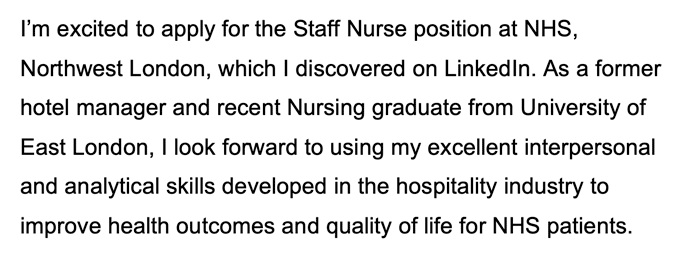
2. Give examples of your transferable skills in the body paragraphs
Similar to how you’d describe transferable skills in the work experience section of your CV, you should use numbers to make your transferable skills concrete for employers in the body of your cover letter:
During my time as a hotel manager, I managed 120+ hotel staff, including coordinating schedules, communicating between departments, and assisting with problems as needed. As a result, my developed interpersonal, time management, communication, and problem solving skills make me uniquely suited to work closely with doctors and nurses, communicate with patients, and assist physicians in diagnosing and treating patient illnesses.




